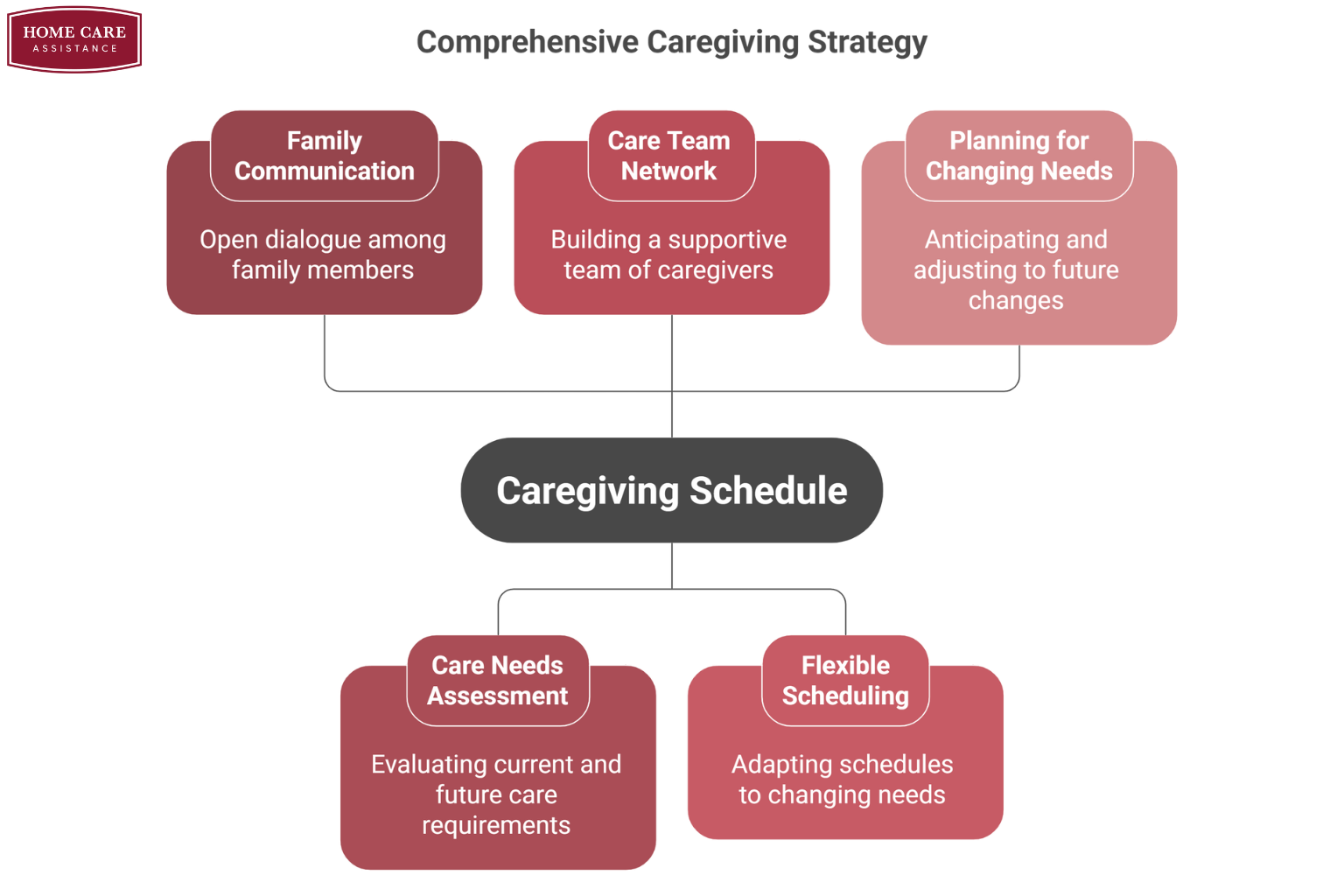
Developing an effective care plan requires thoughtful coordination among family members, healthcare providers, and the person receiving care. A well-structured plan ensures everyone understands their roles while prioritizing your senior loved one’s needs, preferences, and dignity.
Start with Open Family Communication
Clear communication forms the foundation of any successful care plan. Begin by organizing a family meeting where all key stakeholders can discuss expectations, concerns, and available resources.
Essential discussion points include:
- Your loved one’s preferences – What type of assistance does your loved one want, and what independence does he or she wish to maintain?
- Family member availability – Who can provide regular support, and what are their time constraints?
- Financial considerations – What resources are available for professional care services or home modifications?
- Living arrangements – Will care happen at home, in assisted living, or through a combination of settings?
- Emergency protocols – How will urgent situations be handled, and who makes critical decisions?
Document these conversations to create a reference point for future planning sessions. Regular check-ins ensure the plan remains relevant as your loved one’s care needs evolve.
Caring for senior loved ones can be challenging for families who don’t have expertise or professional training in home care, but this challenge doesn’t have to be faced alone. Family caregivers can turn to Home Care Assistance for the help they need. We provide high-quality live-in and respite care as well as comprehensive Alzheimer’s, dementia, stroke, and Parkinson’s care.
Assess Current and Future Care Needs
A thorough assessment helps you identify specific areas where support is needed while anticipating how requirements might change over time. This evaluation should cover physical, emotional, and social aspects of wellbeing.
Key assessment areas include:
- Daily living activities – Bathing, dressing, meal preparation, medication organization, and household tasks
- Mobility and safety – Fall risks, transportation needs, and home accessibility modifications
- Medical care coordination – Doctor appointments, prescription organization, and therapy requirements
- Social and emotional support – Companionship needs, mental health considerations, and community connections
- Cognitive function – Memory concerns, decision-making abilities, and need for supervision
Consider involving healthcare professionals, social workers, or geriatric care managers in this assessment process. Their expertise can help you identify potential issues before they become emergencies.
Build Your Care Team Network
Effective care often requires multiple people working together in coordinated roles. Building a reliable network ensures no single person becomes overwhelmed while providing comprehensive support.
Your care team might include:
- Primary family caregiver – Often coordinates daily care and communicates with other team members
- Healthcare providers – Doctors, nurses, therapists, and specialists who address medical needs
- Professional caregivers – Home caregivers, housekeepers, or companions who provide regular assistance
- Extended family and friends – People who can help with transportation, meal preparation, or social visits
- Community resources – Senior centres, religious organizations, or volunteer programs offering additional support
Clearly define each person’s responsibilities and establish communication protocols. Consider creating a shared calendar or communication app to keep everyone informed about appointments, medication changes, or care updates.
Create Flexible Care Schedules
Successful care plans balance structure with adaptability. Rigid schedules often fail when unexpected situations arise, while overly flexible arrangements can lead to gaps in care coverage.
Effective scheduling strategies include:
- Core care hours – Identify times when assistance is most critical, such as morning routines or evening medication reminders.
- Backup arrangements – Develop contingency plans for when primary caregivers are unavailable.
- Respite care options – Schedule regular breaks for family caregivers to prevent burnout.
- Professional service integration – Coordinate home health visits, therapy appointments, and medical checkups.
- Emergency coverage – Establish 24-hour contact protocols for urgent situations.
Use digital tools like shared calendars or caregiving apps to keep everyone informed about schedule changes. Regularly schedule reviews to help you identify patterns and adjust arrangements as needed.
When researching agencies that provide senior home care, Barrie, ON, families are usually looking for flexible care plans, compassionate and highly trained caregivers, and 24/7 availability. Whether you need respite care to take a break from your caregiving duties or your senior loved one needs around-the-clock assistance at home, you can rely on Home Care Assistance.
Plan for Changing Needs
Care requirements rarely remain static, making adaptability essential for long-term success. Regular plan reviews ensure the care approach continues meeting evolving needs while maintaining quality of life.
Important planning considerations include:
- Health condition progression – How might chronic conditions or aging affect future care needs?
- Caregiver capacity changes – Will family members’ availability or health status impact their ability to provide care?
- Financial sustainability – Are current care costs manageable long-term, and what alternatives exist?
- Living situation modifications – When might home modifications, assisted living, or other arrangements become necessary?
- Legal and financial preparations – Are advance directives, power of attorney documents, and financial plans current?
Schedule quarterly family meetings to review the care plan’s effectiveness. These sessions provide opportunities to celebrate successes, address challenges, and make necessary adjustments before small problems become major crises.
Families who find it difficult to care for their aging loved ones without assistance can benefit greatly from professional respite care. Barrie, ON, family caregivers who need a break from their caregiving duties can turn to Home Care Assistance. Using our proprietary Balanced Care Method, our respite caregivers can encourage your loved one to eat well, exercise regularly, get plenty of mental and social stimulation, and focus on other lifestyle factors that promote longevity. Rely on the professionals at Home Care Assistance to provide high-quality compassionate care for your loved one. Give us a call today at 647-970-3803 to learn about our flexible in-home care plans.
